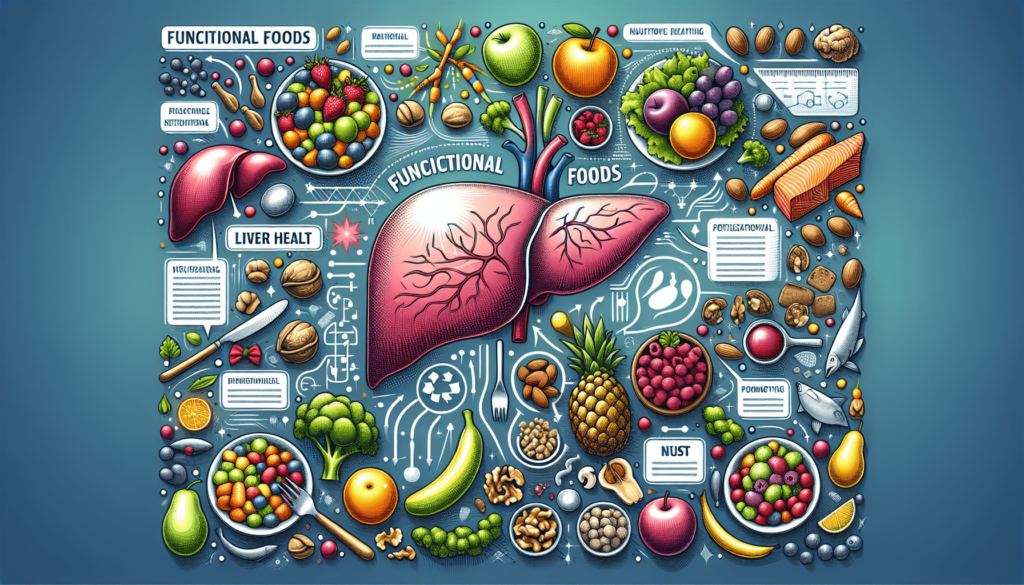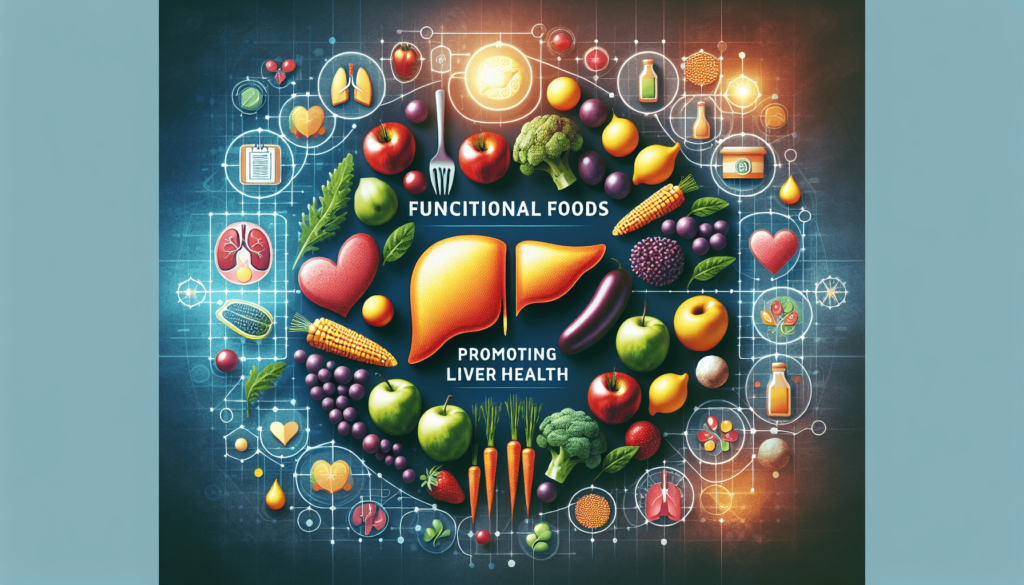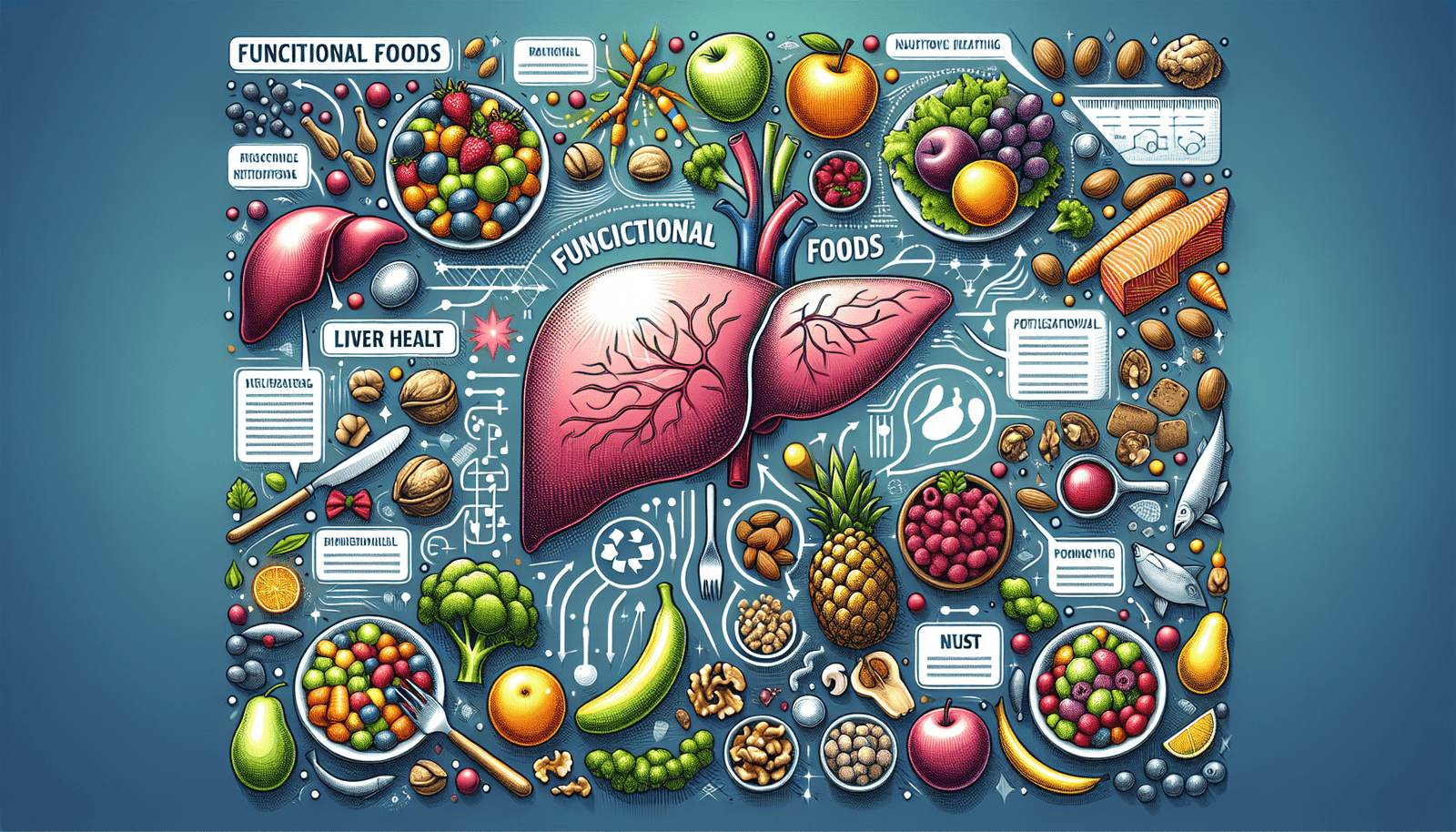It’s amazing how certain foods can do wonders for our overall health, including our liver! We all know that the liver is responsible for countless vital functions in our body, from detoxification to hormone regulation. But have you ever wondered if there are specific foods that can actually support liver health? Well, you’re in luck! In this article, we will explore the fascinating world of functional foods and how they can contribute to the well-being of your liver. So sit back, relax, and get ready to discover the ultimate guide to enhancing your liver health through the power of food.

The Importance of Liver Health
The liver plays a crucial role in maintaining the overall health and functioning of the body. Located in the upper right side of the abdomen, this vital organ performs a wide range of functions that are essential for our well-being. From filtering blood and detoxifying harmful substances to producing bile for digestion and storing vital nutrients, the liver is involved in many important processes.
Functions of the liver
The liver is responsible for several key functions in our body. One of its primary roles is to filter and remove toxins, waste products, and drugs from the bloodstream. It detoxifies chemicals and metabolizes medications to ensure our overall well-being. Additionally, the liver produces bile, a substance necessary for the proper digestion and absorption of fats.
The liver also plays a significant role in metabolizing carbohydrates, proteins, and fats. It stores glucose as glycogen and releases it into the bloodstream when needed, helping to maintain stable blood sugar levels. Moreover, the liver produces important proteins involved in blood clotting, immune response, and transportation of substances throughout the body.
Factors affecting liver health
Several factors can impact the health of your liver. Excessive alcohol consumption is one of the leading causes of liver damage, as it can lead to inflammation and scarring. High sugar and refined carbohydrate intake can contribute to the development of non-alcoholic fatty liver disease (NAFLD), a condition characterized by the accumulation of fat in the liver. Trans fats, fried foods, and processed foods can also contribute to liver damage and inflammation.
Lifestyle habits such as smoking, lack of physical activity, and obesity can have detrimental effects on liver health. Exposure to environmental toxins, certain medications, and viral infections like hepatitis can also damage the liver. Genetics and family history can also play a role in determining individual susceptibility to liver diseases.
What Are Functional Foods?
In recent years, there has been growing interest in the concept of functional foods and their potential benefits for our health. Functional foods are those that go beyond providing basic nutrition and possess additional physiological benefits. These foods contain bioactive compounds that can improve overall well-being and help prevent or manage certain diseases.
Definition of functional foods
Functional foods can be defined as foods that promote optimal health and well-being, beyond their basic nutritional value. They provide additional health benefits by potentially reducing the risk of chronic diseases and improving overall physiological functions. Functional foods can include a wide variety of natural food sources, both plant-based and animal-based, that have been scientifically proven to have positive effects on specific body systems or functions.

Benefits of functional foods
Functional foods offer various benefits for overall health and specific body functions. They can help enhance the immune system, reduce inflammation, improve digestion, support cardiovascular health, promote brain health, and protect against various chronic diseases. By incorporating functional foods into our diet, we can potentially improve our overall well-being and reduce the risk of developing certain health conditions.
Functional Foods for Liver Health
Certain functional foods have been specifically shown to support liver health and promote its optimal functioning. Including these foods in your diet can be a simple and effective way to take care of your liver and help maintain its well-being.
Milk thistle
Milk thistle is a plant that has been used for centuries for its potential liver-protective properties. It contains a compound called silymarin, which has been shown to have antioxidant and anti-inflammatory effects. Silymarin has been found to protect liver cells from damage caused by toxins and stimulate the production of new liver cells.
Turmeric
Turmeric, a bright yellow spice commonly used in curry dishes, contains a compound called curcumin. Curcumin has been extensively studied for its potential benefits in liver health. It has been shown to possess antioxidant and anti-inflammatory properties, which can help protect the liver from damage caused by oxidative stress and inflammation.
Green tea
Green tea is rich in antioxidants called catechins, which have been associated with numerous health benefits. These antioxidants have been shown to support liver health by reducing inflammation and oxidative stress. Regular consumption of green tea may help prevent liver disease and promote the overall well-being of the liver.
Garlic
Garlic contains sulfur compounds that have been found to have potential liver-protective effects. These compounds help activate liver enzymes responsible for the detoxification process and assist in the removal of toxins from the body. Additionally, garlic has been shown to have antioxidant and anti-inflammatory properties, further supporting liver health.
Grapefruit
Grapefruit is a citrus fruit that contains antioxidants and other bioactive compounds that are beneficial to liver health. It has been found to increase the production of detoxification enzymes in the liver and promote the breakdown of toxins. However, it is important to note that grapefruit can interact with certain medications, so it’s recommended to check with your healthcare provider before consuming it regularly.
Beetroot
Beetroot is rich in antioxidants and other beneficial compounds that help support liver health. It contains betaine, which has been shown to protect liver cells from oxidative stress and inflammation. Beetroot also helps stimulate the production of enzymes that assist in detoxification processes in the liver.
Walnuts
Walnuts are not only a delicious snack but also a great functional food for liver health. They are rich in omega-3 fatty acids, antioxidants, and other bioactive compounds that have been associated with improved liver function and reduced inflammation. Including walnuts in your diet can be a simple way to support your liver health.
Fatty fish
Fatty fish, such as salmon, mackerel, and sardines, are excellent sources of omega-3 fatty acids. These fatty acids have been shown to have numerous health benefits, including supporting liver health. Omega-3 fatty acids help reduce inflammation and oxidative stress in the liver, potentially decreasing the risk of liver disease.
Leafy greens
Leafy greens, such as spinach, kale, and collard greens, are packed with nutrients and antioxidants that promote liver health. They are rich in fiber, which aids in digestion and helps eliminate toxins from the body. Leafy greens also contain chlorophyll, a compound that supports liver detoxification processes.
Cruciferous vegetables
Cruciferous vegetables, such as broccoli, cauliflower, and Brussels sprouts, contain compounds called glucosinolates. These compounds are associated with liver-protective effects and have been shown to enhance the liver’s ability to detoxify harmful substances. Including cruciferous vegetables in your diet can contribute to optimal liver health.
Mechanisms of Action
The functional foods mentioned above exert their positive effects on liver health through various mechanisms.
Antioxidant properties
Many functional foods are rich in antioxidants, which help neutralize harmful free radicals and reduce oxidative stress in the liver. By reducing oxidative stress, these foods protect liver cells from damage and promote their overall health.
Anti-inflammatory effects
Inflammation plays a significant role in the development of liver diseases. Functional foods with anti-inflammatory properties, such as turmeric, green tea, and garlic, help reduce inflammation in the liver, supporting its optimal functioning.
Detoxification support
The liver is responsible for detoxifying harmful substances, and functional foods can assist in this crucial process. They stimulate liver enzymes involved in detoxification, ensuring that toxins are efficiently eliminated from the body.
Liver enzyme regulation
Functional foods can regulate the production and activity of liver enzymes, which are essential for proper liver function. By promoting the synthesis and activity of these enzymes, functional foods help maintain a healthy liver.
Protection against liver damage
Several functional foods have been found to protect liver cells from damage caused by toxins, drugs, and other harmful substances. They strengthen the liver’s defense mechanisms and promote its ability to repair itself.
Potential Side Effects and Precautions
While functional foods are generally safe to consume, it’s important to be aware of potential side effects and take necessary precautions.
Allergic reactions
Some individuals may have allergies or intolerances to certain functional foods. For example, milk thistle can cause allergic reactions in some people. If you experience any adverse reactions after consuming a functional food, it’s advisable to discontinue its use and consult a healthcare provider.
Interactions with medications
Certain functional foods, such as grapefruit, can interact with medications, affecting their effectiveness or increasing the risk of side effects. It’s crucial to check with your healthcare provider or pharmacist to ensure there are no potential interactions between functional foods and any medications you may be taking.
Caution for specific medical conditions
Individuals with specific medical conditions, such as gallstones, kidney stones, or liver diseases, should exercise caution when consuming functional foods. It’s important to consult with a healthcare provider to determine the suitability and potential effects of these foods based on specific medical conditions.
Moderation and balanced diet
While functional foods can offer several health benefits, it’s important to consume them in moderation as part of a balanced diet. Excessive consumption of any specific food, even if it’s considered functional, may lead to imbalances and potential adverse effects.
Incorporating Functional Foods Into Your Diet
Incorporating functional foods into your diet can be an enjoyable and beneficial way to support liver health. Here are some tips on how to do so:
Consulting a healthcare provider
Before making any significant changes to your diet, it’s important to consult a healthcare provider. They can provide personalized advice based on your specific health needs and help you determine the most suitable functional foods for your liver health.
Gradual changes and experimentation
Introducing functional foods into your diet should be done gradually to allow your body to adjust. Experiment with different functional foods, try new recipes, and find ways to incorporate them into your meals and snacks.
Variety and diversity
To maximize the benefits of functional foods, it’s important to consume a variety of them. Different functional foods offer different nutrients and bioactive compounds, so aim for a diverse diet filled with a range of liver-supportive foods.
Considerations for cooking
Some functional foods may lose their beneficial properties when cooked at high temperatures or for prolonged periods. To retain the maximum nutritional value of these foods, opt for methods such as steaming, baking, or lightly sautéing instead of deep frying or boiling.
Combining functional foods
Combining functional foods can create synergistic effects and enhance their benefits. For example, incorporating turmeric and black pepper together can increase the absorption of curcumin, the active compound in turmeric. Exploring combinations of functional foods can provide additional health benefits.
Food and Lifestyle Habits That Harm the Liver
While incorporating functional foods into your diet can support liver health, it’s equally important to avoid or minimize certain food and lifestyle habits that can harm the liver.
Excessive alcohol consumption
Excessive alcohol consumption is one of the leading causes of liver damage and can lead to conditions such as alcoholic fatty liver disease, alcoholic hepatitis, and cirrhosis. Limiting alcohol intake or avoiding it altogether is crucial for maintaining a healthy liver.
High sugar and refined carbohydrates
Diets high in sugar and refined carbohydrates have been linked to the development of non-alcoholic fatty liver disease (NAFLD). These foods contribute to increased fat accumulation in the liver and can lead to inflammation and liver damage. It’s important to limit the consumption of sugary beverages, baked goods, and processed foods.
Trans fats and fried foods
Trans fats, commonly found in processed and fried foods, can increase the risk of liver disease by promoting inflammation and oxidative stress. It’s important to read food labels and avoid products that contain partially hydrogenated oils, which are a major source of trans fats.
Processed foods
Processed foods are often high in unhealthy fats, added sugars, and artificial additives. Regular consumption of these foods can contribute to liver damage and increase the risk of developing various liver conditions. Opt for whole, unprocessed foods whenever possible.
Overeating and obesity
Overeating and obesity can lead to the accumulation of excess fat in the liver, contributing to the development of fatty liver disease. Maintaining a healthy weight through portion control, a balanced diet, and regular physical activity is essential for liver health.
Lack of physical activity
A sedentary lifestyle can increase the risk of various health conditions, including liver disease. Regular physical activity helps maintain a healthy weight, improve insulin sensitivity, and support optimal liver function. Aim for at least 150 minutes of moderate-intensity exercise per week.
Other Lifestyle Factors For Liver Health
In addition to dietary choices, there are other lifestyle factors that can significantly impact liver health.
Hydration
Maintaining adequate hydration is crucial for overall health, including liver health. Drinking enough water helps flush out toxins from the body and supports proper liver functioning. Aim to drink at least eight glasses of water per day.
Adequate sleep
Getting sufficient quality sleep is essential for liver health. During sleep, the body carries out important restorative processes, including repairing and regenerating liver cells. Aim for seven to eight hours of uninterrupted sleep each night.
Stress management
Chronic stress can have negative effects on liver health. High levels of stress hormones can lead to inflammation and oxidative stress in the liver. Engaging in stress-reducing activities such as meditation, yoga, or spending time in nature can be beneficial for liver health.
Avoiding exposure to toxins
Limiting exposure to toxins and chemicals is important for maintaining liver health. Avoiding excessive use of household chemicals, reducing exposure to environmental pollutants, and following safe handling practices for hazardous substances can protect the liver from potential damage.
Research and Scientific Evidence
There is a growing body of research exploring the effects of functional foods on liver health. Numerous studies have shown promising results, highlighting the potential benefits of incorporating these foods into our diets.
Overview of studies
Several studies have demonstrated the positive impact of functional foods on liver health. These studies have shown that functional foods, such as milk thistle, turmeric, green tea, and garlic, can help reduce inflammation, support liver detoxification processes, and protect liver cells from damage.
Clinical trials
Some clinical trials have specifically investigated the effects of functional foods on liver health. These trials have provided valuable insights into the potential mechanisms of action and the overall effectiveness of functional foods in promoting liver health.
Current limitations
Despite the promising findings, it’s important to note that the research on functional foods and liver health is still ongoing. Many studies have been conducted on animal models or in vitro settings, and more human trials are needed to establish stronger evidence. Additionally, individual variations, such as genetics and overall lifestyle, can influence the response to functional foods.
Conclusion
The health of our liver is of utmost importance for our overall well-being. Incorporating functional foods into our diets can be a valuable strategy to support liver health and optimize its functioning. Milk thistle, turmeric, green tea, garlic, grapefruit, beetroot, walnuts, fatty fish, leafy greens, and cruciferous vegetables are some examples of functional foods that have been associated with beneficial effects on the liver.
These functional foods work through various mechanisms, including their antioxidant, anti-inflammatory, and detoxification properties. While incorporating functional foods, it’s important to consider potential side effects, interactio
